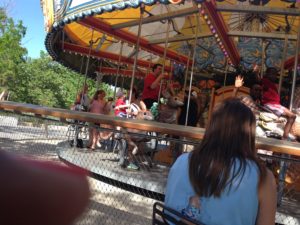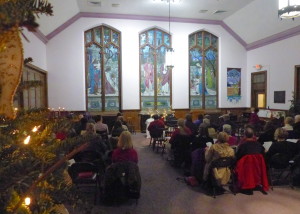 One of the scribes came near and heard them disputing with one another, and seeing that he answered them well, he asked him, ‘Which commandment is the first of all?’ Jesus answered, ‘The first is, “Hear, O Israel: the Lord our God, the Lord is one; you shall love the Lord your God with all your heart, and with all your soul, and with all your mind, and with all your strength.” The second is this, “You shall love your neighbor as yourself.” There is no other commandment greater than these.’ Then the scribe said to him, ‘You are right, Teacher; you have truly said that “he is one, and besides him there is no other”; and “to love him with all the heart, and with all the understanding, and with all the strength”, and “to love one’s neighbor as oneself”,—this is much more important than all whole burnt-offerings and sacrifices.’
One of the scribes came near and heard them disputing with one another, and seeing that he answered them well, he asked him, ‘Which commandment is the first of all?’ Jesus answered, ‘The first is, “Hear, O Israel: the Lord our God, the Lord is one; you shall love the Lord your God with all your heart, and with all your soul, and with all your mind, and with all your strength.” The second is this, “You shall love your neighbor as yourself.” There is no other commandment greater than these.’ Then the scribe said to him, ‘You are right, Teacher; you have truly said that “he is one, and besides him there is no other”; and “to love him with all the heart, and with all the understanding, and with all the strength”, and “to love one’s neighbor as oneself”,—this is much more important than all whole burnt-offerings and sacrifices.’
I do not remember my first encounter with a rocking horse. But I do remember the last ti me I rode one. I had taken, David, my grandson to the park and he was his energetic self, running all over the playground going from this fun to that fun to the next… After some time I looked over at the empty rocking horses; they were the most appealing toy to a tired grown-up who needed a break. I held David’s hand and excitedly pointed, “Look,” I said, “a rocking horse, let’s go for a ride.” I sat him on one horse, and straddled the one next to him and we began riding, well…rocking actually. Ten seconds later he was scrambling to get down. “No,” I encouraged him, “let’s ride some more.” But he could not dismount that horse fast enough. This was NOT his idea of play. Why do you think? It was going nowhere! It was all show and no go!
me I rode one. I had taken, David, my grandson to the park and he was his energetic self, running all over the playground going from this fun to that fun to the next… After some time I looked over at the empty rocking horses; they were the most appealing toy to a tired grown-up who needed a break. I held David’s hand and excitedly pointed, “Look,” I said, “a rocking horse, let’s go for a ride.” I sat him on one horse, and straddled the one next to him and we began riding, well…rocking actually. Ten seconds later he was scrambling to get down. “No,” I encouraged him, “let’s ride some more.” But he could not dismount that horse fast enough. This was NOT his idea of play. Why do you think? It was going nowhere! It was all show and no go!
I guess I could just get right to the point of this rocking horse sermon and say that as Christians we need to stop merely going through the motions, get off our rocking horses, and get about the business of spreading our salt and shining our light. But not so fast. The trajectory on which this sermon began to travel two or three weeks ago was tragically disrupted by a horrific mass shooting in Orlando last Sunday morning. It wasn’t the kind of event that I could keep calm and go on preparing my tidy little rocking horse sermon. No, the rocking horse took on more significant proportions as I read the Scripture, and read the news, and re-read the Scripture, and heard more news. The increasingly dissonant and mournful soundtrack against which I read Mark 12 could not be dismissed.
weeks ago was tragically disrupted by a horrific mass shooting in Orlando last Sunday morning. It wasn’t the kind of event that I could keep calm and go on preparing my tidy little rocking horse sermon. No, the rocking horse took on more significant proportions as I read the Scripture, and read the news, and re-read the Scripture, and heard more news. The increasingly dissonant and mournful soundtrack against which I read Mark 12 could not be dismissed.
At first Jesus’ conversation with the religious leader looks pretty mundane – of course we are to love the Lord, our God with everything we are, and of course we are to love our neighbor as ourselves. Except that…God doesn’t change. We can learn and grow in our love for God, who is the same yesterday, today, and forever. We can begin to think we are masters of that love (especially if you’ve earned anything like a Master of Divinity degree.) But our neighbors change. So just as we think we’ve learned to love our neighbor, we look over and someone else has moved in. Do we have to love them too?
Well let’s just reflect together for a bit on this two-part commandment: love the Lord your God with all that you are, and love your neighbor as yourself. For us, as children of God, this is not an option. For us, as disciples of Christ, loving God is no more an option than breathing is for a human being. Love is who God is; and if we spend any amount of time in God’s company, through prayer, through meditation on the Scriptures, through worship, through study and service, through fellowship with other people of God, love is something that we become, even more than something that we do. God is love, and all who are born of God are born of love, and learn to love. Love is in our DNA as children of God, born of the Spirit, born from above.
Love is who God is; and if we spend any amount of time in God’s company, through prayer, through meditation on the Scriptures, through worship, through study and service, through fellowship with other people of God, love is something that we become, even more than something that we do. God is love, and all who are born of God are born of love, and learn to love. Love is in our DNA as children of God, born of the Spirit, born from above.
Which makes the second greatest commandment flow quite naturally from the first. Let me say this a few different ways. We love our neighbor, because we love God. We can’t really grow in our love for neighbor unless we are growing in our love for God. It is our loving response to God’s love for us that teaches us how to love our neighbor. We love as God loves us; we forgive, as God forgives us; we include those who are not like us, as God includes us, we who are not like God. We’re following a Divine model here. There’s so much that can be said about this Divine model of love on any given day, but there are three aspects about it that I find instructive as I slowly emerge from the shock of yet another tragedy, and wonder what can I possibly do that will be of any significance.
First is that God’s love happens in and for the benefit of community. God, who has every reason to be narcissistic, has chosen instead to be represented by a community of three (Parent, Son, and Holy Spirit,) and has opened up that community to all that is not God. God so loved the world that God gave God’s only begotten son that whosoever believes in him, should not perish but have everlasting life. (John 3:16) Anyway you unravel or interpret that Scripture it boils down to God opening up God’s self to include all of creation. When we love in – and for the benefit of – community, we are patterning God’s love.
Then, God’s love is also sacrificial. If in loving God and loving our neighbor we don’t
experience some degree of inconvenience, we may want to look at the model again. The ultimate Divine ‘inconvenience’ happened to be death by crucifixion, and some of God’s people have suffered similar inconvenience throughout the ages, up to today! But the inconvenience of loving isn’t always extreme. It may call for giving up some of our time, some of our resources, some of our precious beliefs and ideologies, some of our prejudices, and even some of our rights. Whatever the cost, love that reflects God’s love comes with some degree of inconvenience and sacrifice.
The final aspect of God’s love that I find instructive is that it’s stubborn. It’s persistent, it’s tenacio us, and it’s dogged. It suffers long, and is kind. It does not envy, does not parade itself, and is not puffed up. It does not behave rudely, does not seek its own, is not easily provoked, and thinks no evil. (Is this sounding familiar?) God’s love is stubborn because it bears all things, it believes all things, it hopes all things, it endures all things, God’s love never fails!! When people ask for this passage to be read at their weddings, I remind them that this is not human love. We may rightly aspire to this, but in actuality the apostle was holding up a model of Divine love to a bunch of folks who needed a radically different model of getting along.
us, and it’s dogged. It suffers long, and is kind. It does not envy, does not parade itself, and is not puffed up. It does not behave rudely, does not seek its own, is not easily provoked, and thinks no evil. (Is this sounding familiar?) God’s love is stubborn because it bears all things, it believes all things, it hopes all things, it endures all things, God’s love never fails!! When people ask for this passage to be read at their weddings, I remind them that this is not human love. We may rightly aspire to this, but in actuality the apostle was holding up a model of Divine love to a bunch of folks who needed a radically different model of getting along.
When violence and tragedy strike again, and again, and again, with blunt numbing force, we need a stubborn love that never fails. When leaders and aspiring leaders advance models of division, bigotry, prejudice, and cowardice, we need a stubborn love full of courage that does not behave rudely and does not seek its own interest, but the interests of others. As disciples of Jesus we have a different model of being community. The challenge before us is whether in the face of evil we will respond in kind or in love. My brothers and sisters in Christ, the love we are and the love out of which we operate is not defined in any dictionary, it is modeled for us in Jesus the Nazarene carpenter who loved enough to lay down his life for his friends. And as one pastor has said, “You’ve never locked eyes with anyone who doesn’t matter deeply to God.”1
When we get weary of loving like this, because it does take a toll on us, we yearn for some reprieve. In such an instance a rocking horse is a fine thing. It keeps us in motion without going anywhere. It may even hypnotize us so we don’t feel the pain and the anger as much. But it is not the vehicle of God’s salvation, nor is it the way of the cross. It is all show and no go. As the apostle reminded the Corinthian Christians, going through the motions of speaking with a silvery tongue without love means nothing; going through the motions of demonstrating high intelligence and understanding of all mysteries and all knowledge without love means nothing; going through the motions of demonstrating faith, without love means nothing. We can even go through the motions of feeding the poor, and exhausting ourselves in service to those less fortunate than us – the apostle calls it going through the motions unless there is deep motivating love behind it all.
If I were to offer a counter idea to the rocking horse, it would be the idea of horsepower! The term was originally coined when the steam engine was being marketed in the late 18th century. People didn’t understand how engines could work, but they knew about the kind of work horses could do. If we want to talk about efficiency and effectiveness in our mission as Jesus’ followers, then I suggest we begin with the horsepower of love. And I am bold enough to proclaim this morning, that there is no engine, no weapon, no demonstration of power or energy that can outperform love. How many of us this week have heard, watched, and read so many amazing stories of love in action in response to the Orlando tragedies? There’ve been stories of kindness, compassion, courage, bravery, sacrifice – stories of God’s love in action through the community of humankind, and yes, even through comfort animals.
Friends, these are not the times for high horses, dark horses, wild horses, hobby or rocking horses. Sin and evil abound in our land, but we believe that Where sin increased, grace increased even more. (Romans 5:20) In the end, after evil has taken its best shot, after hatred has gone its distance, after insanity has expended all its energy, there remains the everlasting horsepower and the enduring legacy of the love of God – that community-enriching love, that sacrificing love, that stubborn love – channeled into the world through you and through me right where we are, every day that we live. People of God, may we rise to the challenge! AMEN.
1 http://www.orlandosentinel.com/opinion/columnists/os-the-sermon-on-pulse-you-didn-t-hear-in-church-20160612-story.html. Accessed June 18, 2016.
